

A Literacy Lesson from China: What an Exuberant Culture of Reading Can Teach Us. An elementary school in Shanghai.
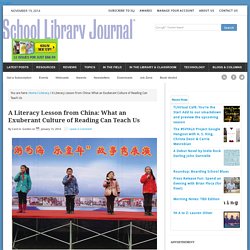
It was a long, cold ride at 7 a.m. from central Shanghai to a rural elementary school in Hefei. I had come to China to visit seven schools participating in an innovative literacy program, the Stone Soup Happy Reading Alliance (SSHRA), funded by the Hong Kong-based Chen Yet-Sen Family Foundation. Www.heinemann.com/shared/onlineresources/e00492/chapter6.pdf. Darren Shan's tips for getting reluctant readers back into reading. I think one of the biggest reasons many teenagers choose to stop reading is that they see books as part of the educational system, something to be endured rather than enjoyed.

This is natural, given the amount of adults out there banging on the same old stale soundbite of a drum, the one that goes "Reading is important". Nagy_Herman_1987.jpg (321×428) Why-read-20-minutes-at-home-poster.jpg (1650×1275) Files.eric.ed.gov/fulltext/ED496343. LISTSERV 16.0 - LM_NET Archives. 25 Ways Schools Can Promote Literacy And Independent Reading. 25 Ways Schools Can Promote Literacy Independent Reading by Kimberly Tyson, Ph.D., learningunlimitedllc.com In the age of the Common Core and its emphasis upon having students take on more challenging text, independent reading and student choice can easily take a back seat to the demands of increased rigor.
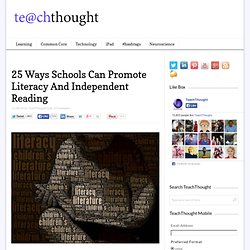
However, in a balanced literacy program, they remain important. Motivation and choice play key roles in reading. And, strong and capable readers are those who read widely and diversely in a wide variety of genres and text types. In the quest to build capable readers, promoting independent, self-selected reading remains key. We want kids to read more. So let’s do our part to promote and encourage independent reading across our schools. 25 Ways Schools Can Promote Independent Reading. 103 Things to Do Before/During/After Reading. International Reading Association : Search Results. IF-AT - The Effects of Immediate Feedback on Reading Achievement. This independent, quasi-experimental study found that after just six months, students receiving immediate feedback demonstrated twice the gain in reading comprehension of students not receiving immediate feedback.
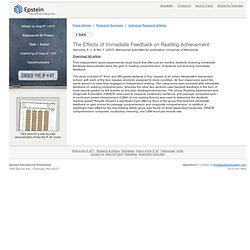
The study included 67 third- and fifth-grade students in four classes at an urban, Midwestern elementary school, with each of the four classes randomly assigned to study condition. All four classrooms spent the same amount of class time engaged in independent reading. Two classrooms were provided with immediate feedback on reading comprehension, whereas the other two sections used delayed-feedback in the form of book reports graded by the teacher as the main feedback mechanism.
The Group Reading Assessment and Diagnostic Evaluation (GRADE) was used to measure vocabulary, sentence, and passage comprehension. Untitled Document. Contents of Developing Readers in the Academic Disciplines by Doug Buehl. Contents of Sustaining Strategic Readers Techniques for Supporting Content Literacy in Grades 6–12 by Valerie Ellery, Jennifer L. Rosenboom.
Contents of Adolescent Literacy Instruction Policies and Promising Practices by Jill Lewis and Gary Moorman, editors. Contents of Young Adult Literature in the Classroom Reading It, Teaching It, Loving It by Joan B. Elliott and Mary M. Dupuis, editors. Contents of Creating Lifelong Readers Through Independent Reading by Barbara Moss, Terrell A. Young. Contents of To Be a Boy, To Be a Reader Engaging Teen and Preteen Boys in Active Literacy (Second Edition) by William G. Brozo. Free Reading. Independent. Bernice E.
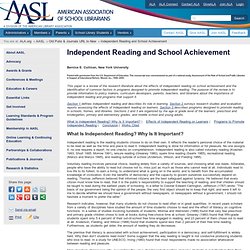
Cullinan, New York University Printed with permission from the U.S. Department of Education. This manuscript was commissioned as part of a national study, Assessment of the Role of School and Public Libraries in Support of Educational Reform, Westat, Inc., 1998–2000. This paper is a review of the research literature about the effects of independent reading on school achievement and the identification of common factors in programs designed to promote independent reading.
Want a Stronger Democracy? Invest in Education. Edward L.
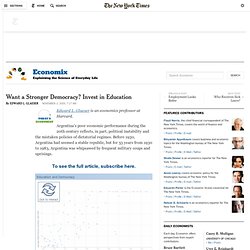
Glaeser is an economics professor at Harvard. Argentina’s poor economic performance during the 20th century reflects, in part, political instability and the mistaken policies of dictatorial regimes. Before 1930, Argentina had seemed a stable republic, but for 53 years from 1930 to 1983, Argentina was whipsawed by frequent military coups and uprisings. Why was Argentina unable to remain a stable democracy? Education, education, education. What Works Clearinghouse: Adolescent Literacy. What should I read next. Booklamp.org Home. LibriVox. 10 great science fiction novels that have been banned. 20 Science Books Every Scifi Fan (and Writer) Should Read. 50 Most Influential Books of the Last 50 (or so) Years. In compiling the books on this list, the editors at SuperScholar have tried to provide a window into the culture of the last 50 years.

Ideally, if you read every book on this list, you will know how we got to where we are today. Not all the books on this list are “great.” The criterion for inclusion was not greatness but INFLUENCE. All the books on this list have been enormously influential. The books we chose required some hard choices. We also tried to keep a balance between books that everyone buys and hardly anyone reads versus books that, though not widely bought and read, are deeply transformative.
40 Modern Nonfiction Books Everyone Should Read. We Can't Teach Students to Love Reading. By Alan Jacobs While virtually anyone who wants to do so can train his or her brain to the habits of long-form reading, in any given culture, few people will want to.
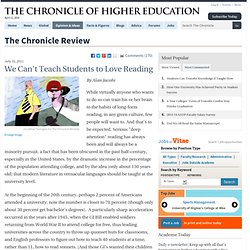
And that's to be expected. Serious "deep attention" reading has always been and will always be a minority pursuit, a fact that has been obscured in the past half-century, especially in the United States, by the dramatic increase in the percentage of the population attending college, and by the idea (only about 150 years old) that modern literature in vernacular languages should be taught at the university level. At the beginning of the 20th century, perhaps 2 percent of Americans attended a university; now the number is closer to 70 percent (though only about 30 percent get bachelor's degrees).
Novel Approach: Reading Courses As An Alternative To Prison. With one of the highest incarceration rates in the world, and the death penalty, the US state of Texas seems the last place to embrace a liberal-minded alternative to prison.
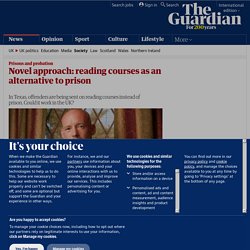
But when Mitchell Rouse was convicted of two drug offences in Houston, the former x-ray technician who faced a 60-year prison sentence – reduced to 30 years if he pleaded guilty – was instead put on probation and sentenced to read. The Evidence Base for English Language Arts: Fluency. What We Know Fluency is a combination of three elements of reading: automaticity - how quickly a reader can decode words and translate a series of letters into a meaningful word; rate - how many words are read correctly per minute; and prosody - how well the reader can make reading sound like speech by adjusting pitch, expression, intonation, emphasis and phrasing.
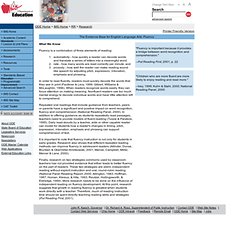
National Endowment for the Arts - Reading. Learning From What Doesn't Work.